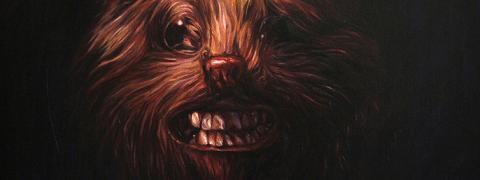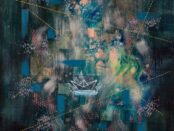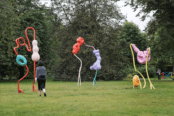Michael Gira describes this album as “the culmination of every previous Swans album as well as any other music I’ve ever made, been involved in or imagined.” For a group as mythologised and self-mythologised as the Swans, it’s a typically bold statement and also a hostage to fortune.
When the group returned in 2010 their comeback album seemed curiously muted and made little impression on me, whereas the live show was mostly very impressive. The Seer is much closer to those live shows in spirit.
Swans Seer dvd trailer from Marco Porsia on Vimeo.
Some passages sound like extended live variations and Gira says he expects them to change further when played live. The result is a sprawling, uninhibited work on an epic scale, in parts essential and in parts inessential. The lengthy songs are full of abrupt shifts, songs within songs, dead halts and dead ends.
[box] a sprawling, uninhibited work on an epic scale[/box]
It opens dramatically with ‘Lunacy’, which demonstrates the slow Krautrock atmosphere that surfaces a few times in the course of the album. The repeated chants of “Lunacy-Lunacy-Lunacy” and the harmonies lend a slightly medieval feel and there is even a trace of neofolk. In contrast, the last section bears a trace of early Pink Floyd.
‘Mother of the World’ starts out much more urgently with an angular 1-2 rhythm, much more in classic Swans style. The next section is marked (or marred) by an irritating improv vocal, fortunately displaced by the fast section from what seems like a completely different song, which in turn decelerates to be replaced by a more melodic final section with the repeated refrain “in and out in and out and in and out again…”, very much in the old style.
‘The Seer’ itself is a 32 minute-plus epic, introduced by the impressive sounds of bagpipes and drones. It gradually gains speed, stops and starts and takes some interesting detours but again is undermined by absurd vocal effects in places. I can see some of this material going down better with some of the Dalston hipsters who attended Gira’s solo gig at Cafe OTO in the spring.
A song (or suite of songs) on this scale almost demands to be treated as an album in itself and since Gira describes the songs as unfinished it’s hard to reach a definitive verdict on them. In a very different style, ‘The Seer Returns’ features ex-Swans member Jarboe on a song with a sleazy feel that might work very well on a David Lynch soundtrack.
’93 Ave B. Blues’ is the most uneasy and experimental piece, with abstract vocals a little like a Tibetan chant. This is also clearly a work in progress but it has a clearer focus than some of the others, even in the closing freak-out section. By contrast, ‘Song for a Warrior’ (featuring Karen O.) is pleasant but doesn’t seem as profound as it wants to be. Strangely, it again has a Pink Floyd feeling at one point – which is not something I ever imagined I’d write in relation to Swans.
‘Avatar’ is much more typically Swans in the sense of urgency and drama. Opening with bells it gradually builds into a dark and aggressive piece that will surely have a great impact live. The repeated phrase “Your Life is in My Hands” isn’t aggressively delivered but certainly has a dark undertone. This is one of the most disciplined and coherent parts of the album and all the better for it.
‘A Piece of the Sky’, which opens with a sampled fire provided by Ben Frost, certainly creates an atmosphere and also acknowledges the Swans’ distant industrial past. An ethereal choir of voices introduces a long section that sounds very similar to some of the soundtracks to Hermann Nitsch‘s infamous actions and all the better for it.
01 The Apostate – edit by GOLDSTARPR
The only problem is that when the song proper emerges it can’t quite reach the same level of intensity and the final section seems disappointingly light in comparison. Barbaric as it may be, this makes me wish the songs were sub-divided into more separate tracks.
After that 19 minute suite we reach the conclusion. The 23 minute(!) ‘The Apostate’. It’s based around long, drawn-out drumming, and takes a darker turn as it goes on, despite some more ethereal elements. At times it’s very Krautrock, at other times it’s a bit scrappy. Gira doesn’t always sound fully himself and maybe that’s the point.
[box] some will surely hail it an instant classic[/box]
So what are we left with? Is this a compelling work that will come to seen as a high point in the Swans oeuvre? In terms of scale it’s certainly a grandiose work, but whether it’s on the same scale of importance as their most important albums it’s too soon to say, even if some will surely hail it an instant classic, simply for the fact that it’s the Swans.
Others may see it as a travesty but the truth is somewhere in between. The second half is definitely more interesting and there are some very impressive passages but also some seriously over-extended ones.
The Seer may well be a grower and may accumulate more power with time, but I find it striking that after listening to it the Swans songs I hear in my head are mostly those from much earlier. Time will tell if this changes… although whether I or others are going to invest sufficient time to fully absorb this sprawling, unfinished work remains to be seen.
The Seer is released on August 28th 2012
[button link=”http://www.facebook.com/pages/Swans/13879391977″ newwindow=”yes”] Swans on FaceBook[/button]

From Speak and Spell to Laibach.





















This is a decent review, but there are some problems in how and where you draw critiques, and this is mostly when you do not stop to consider the clear intentionality and purpose of certain artistic choices. For instance the “irritating” and “absurd” vocal passages you cite. It is obvious that Gira Intended the vocals in “Mother of the World” to be out of any discernible key, and so it is obvious that like the similarly serial whistle in “I Was a Prisoner in your Skull” the odd humming is not there to satisfy or ground or please the listener, so why deride it for not doing so?
Most of the problems I see in your review are not unlike this. I feel that as a reviewer you ought to tell us how well or not the artist does what he intends to to, how well or not the artist fulfills his unique vision–not to tell us how much or how little his work appeases you, which really is neither here nor there since no one’s personal tastes ever completely allign with those of anyone else, especially those of the artist himself.
Thanks for your comment. I find The Seer extremely opaque, not only aesthetically, but in terms of what the artist’s intentions may or may not have been, so it is difficult to comment on those. Moreover, a review is always necessarily personal to some extent and I am giving a partly personal response. I’m writing as someone with some knowledge of and respect for the group and believe me, there are far harsher things being said about the revived Swans elsewhere. I have mixed, though certainly not entirely negative, feelings about the work and this review reflects that.
That is interesting–what about its aestheics or the artist’s intetuons do you find opaque? I definitely would not mind reading a harsh review but I expect the writer’s points not to be groundless, which I found some of yours to be. What if I critiqued John Cage’s 4’33” for not having a crescendo or Glenn Branca for being too loud or Sunn for not having enough melody or Magma for writing literally inscrutable lyrics.
Maybe you should have mentioned the opacity of Gira’s vision and based your critiques on that. I would love to read why you think it opaque, which would bring about an insightful new discussion. What separates your opinions from those of just some lackadaisical or impulsive blogger is that I expect you to provide more than just a sentimental opinion which only your personal taste grounds, for who else but you has access to that and so who reading this gets anything out of it? I appreciate the breadth of your review but I would have also appreciated more intensity and intelligent discussion.
Think of an artist’s work as a statement or argument. I would love to read a good analysis of either, or even a refutation, since those things expand on what the artist already said. Is the statement or argument sound? That is what I want a review to answer. Whether you agree or disagree with the artist’s statement or argument is beside the point, as it amounts to saying “yes” or “no,” and I highly doubt that by making this album Swans was asking a “yes or no” question.
I would have appreciated being sufficiently inspired to address it in more detail but ultimately it failed to inspire me sufficiently (although it did in part). It may be that with further intensive listening it would become less opaque to me but my honest feeling is that I have already spent enough time discussing it. Nevertheless, I’m pleased if you and others find more inspiration in it than I do.
straw man